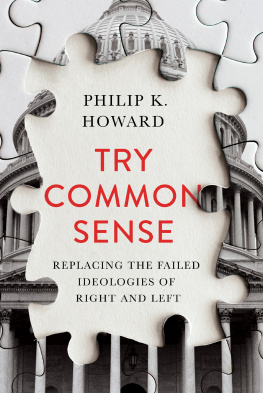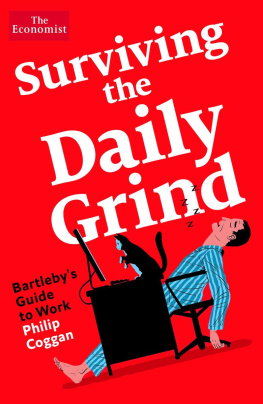Contents
Guide

ALSO BY PHILIP K. HOWARD
The Rule of Nobody
Life Without Lawyers
The Collapse of the Common Good
The Death of Common Sense
TRY
COMMON
SENSE
REPLACING THE
FAILED IDEOLOGIES OF
RIGHT AND LEFT
PHILIP K. HOWARD

Copyright 2019 by Philip K. Howard
All rights reserved
First Edition
For information about permission to reproduce selections from this book, write to Permissions, W. W. Norton & Company, Inc., 500 Fifth Avenue, New York, NY 10110
For information about special discounts for bulk purchases, please contact W. W. Norton Special Sales at specialsales@wwnorton.com or 800-233-4830
Book design by Chris Welch Design
Production manager: Julia Druskin
The Library of Congress has cataloged the printed edition as follows: is available
ISBN 978-1-324-00176-8
ISBN 978-1-324-00177-5 (ebk.)
W. W. Norton & Company, Inc., 500 Fifth Avenue, New York, N.Y. 10110
www.wwnorton.com
W. W. Norton & Company Ltd., 15 Carlisle Street, London W1D 3BS
WITH GRATITUDE TO MY EARLY MENTORS EUGENE WIGNER, KENT BARWICK, JOHN WARDEN, AND ARTHUR SCHLESINGER, JR.
CONTENTS
PART I
REPLACING A FAILED PHILOSOPHY
PART II
FOUR PRINCIPLES FOR PRACTICAL GOVERNMENT
T he 2016 election of Donald Trump showed, sooner than I expected, that voters are so fed up with overbearing government that they were ready for change at almost any price. But the tepid response by both parties surprised me more. After continuing to work through 2017 with the new administration and Congress to try to unstick the gears, I realized that persuading Washington is hopeless. The political parties just continue to sow partisan distrust instead of dealing with the root causes of voter anger. They compete by dividing society, and rely on the lack of credible political alternatives to take turns in power without actually taking responsibility to fix things. Their duopoly has settled into a predictable pattern: First you fail, then I fail.
Fixing Washington requires more than new leaders and new variations on partisan orthodoxies. It requires a new governing vision, propelled by public demand, for a basic overhaul of how government works. Reforming the current system will not be sufficient. Pretty much everything run by government is brokenschools are bad, health-care costs are out of control, regulation is impractical, infrastructure is decrepit, Washington is a feeding trough,... and neither Congress nor the president has a coherent vision of how to deal with any of these problems.
Whats needed is a governing philosophy that re-empowers people to make practical choices. The parties argue about ideological abstractions when voter anger stems mainly from the stifling of sensible decisions throughout society.
Most people want to be practical in their daily encounters. We want the teacher or principal to listen to us, and have the ability to make a decision. We want elected leaders to deal with problems, and to try something else if the first solution doesnt work. We want a workplace where people want to pitch in and expect others to do the same. Letting people make practical choices is not a radical idea, of course. The Framers embraced this practical ideal and created a framework in which Americans could pursue their dreams and live their values.
Practicality requires one essential element: people must be free to take responsibility. Only a person on the spot, not a bureaucratic rulebook, can make choices that are practical and fair. Thats not possible in modern government, which is organized to dictate correct choices in advance.
In this book I propose a new governing philosophy built on the bedrock of human responsibility and accountability. Law should set goals and governing principles, and leave implementation to people on the ground. To get things done, and feel good about themselves, people need to have more ownership of their daily choices. Their choices can be judged, but they cant be dictated in advance without causing alienation and failure. This requires a radical simplification of government, area by area.
Under this new governing philosophy, choices can be practical. People are empowered to take into account all the circumstances. Instead of uniformity, it encourages local differences. Instead of aspiring to avoid disagreement with clear rules set out in advance, it encourages argument over whats right. Instead of legal entitlements, it aspires to balance different interests. Instead of requiring objective proof, it allows people to make judgments based on their perceptions and values. Instead of judging people by legalistic compliance, it judges them by the results they achieve and their good faith.
Americas current governing philosophy, created after the 1960s, dictates governing choices out of a huge legal machine, programmed with about 150 million words for federal law. Its one virtue, at least to people in Washington, is that it absolves them from having to take responsibility for how things actually work. What keeps it in place, despite its failure, is distrust.
Americas two political parties are mighty engines of distrust. They draw ideological lines in the sand and thrive on polarization. Their solutions are either negative (Stop the regulator!) or self-interested (Give me my rights!). What they share is a governing philosophy grounded in distrust of people taking responsibility. The worse things work, the more reluctant we are to let anyone make decisions. Just imagine the abuses if teachers, inspectors, managers, and citizens were able to work out disagreements, and be accountable for how they did.
The decline of responsibility in Washington over the past fifty years has been accompanied by a rise in apathy and selfishness in the broader culture. Working for the common good seems nave. Why bother to get involved? You cant make a difference anyway. A culture not tethered to responsible individuals is soon dominated by self-interested demands. The common good? Just kick that can down the road.
Theres a lot to talk about here, but the first hurdle is to convince you that proposing a practical governing philosophy is itself a practical exercise. Washington, we all know, is not exactly responsive to voter needs. It can barely pass a budget, much less overhaul its governing structure. Its defective approach to governing is compounded by a vacuum of leadership. It is unlikely to fix this problem. Change will only come from the outside. Historic shifts in our governing structure always require overwhelming public pressureas, for example, in the Great Depression or the civil rights movement in the 1960s.
Public demand for a new governing philosophy can impact the culture long before the structures collapse of their own weight. Values have their own power. Having a principled basis for practical decisions may inspire people to make them. It will provide a vocabulary for dealing with daily idiocies in schools, hospitals, and government. Today people are awash in endless rules and legalisms, without any principled basis for getting to a reasonable solution.
Find any good public program, or, indeed, any successful enterprise, and you will see people who make choices based on what they think is right and sensiblenot rote compliance. Embracing a public philosophy of practical responsibility will bring these outlaws out of the shadows and up on a pedestal of legitimacy and honor. It will encourage others to follow their lead. Americans can act like Americans again.











